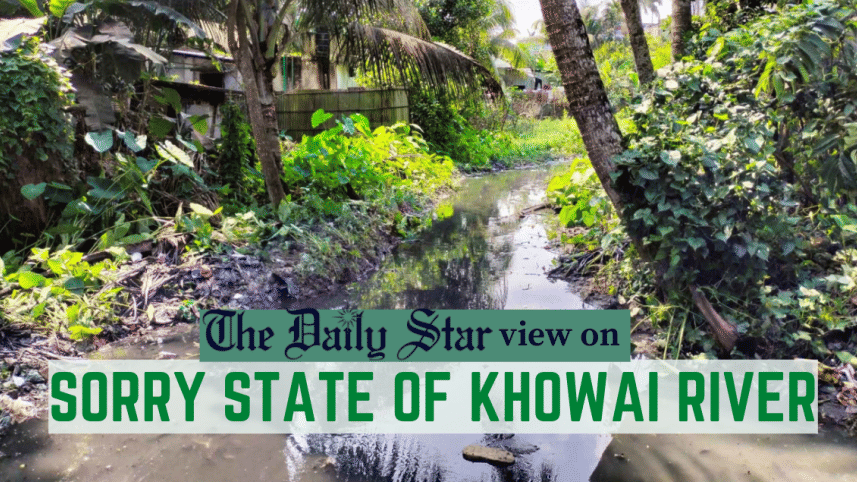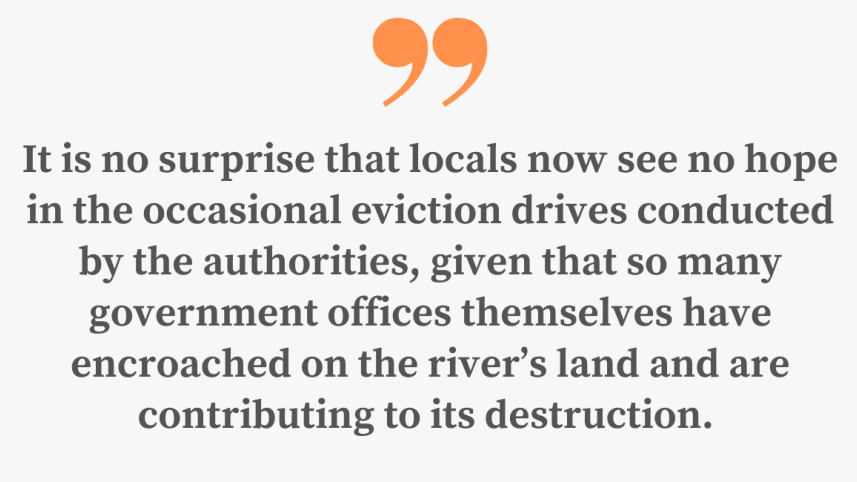Another river on its way out

It's quite alarming that even after so many protests, pledges and a historic High Court verdict declaring rivers as "living entities", little is being done to stop ongoing onslaughts on our rivers by encroachers and polluters. One such river, which has been dying slowly for nearly a decade, is the Old Khowai that flows through Habiganj, Sylhet. It was once 250 to 300 feet wide, and a lifeline for the district. But now, it has narrowed down to 20 feet in some places, as over 2,000 illegal establishments by both individuals and public authorities tower over it. Besides, the incessant dumping of waste has left little room for the river to breathe, let alone provide livelihood to fishermen.
According to locals, government initiatives including recent re-dredging and rehabilitation projects undertaken to restore Old Khowai's navigability have failed completely. Unfortunately, many rivers across the country are more or less suffering the same fate. In the absence of effective interventions, they are being encroached and polluted, many losing their navigability and turning into mere canals in the end.

For Khowai, this is especially unfortunate because promising initiatives had been taken to revive it. In 2019, the Water Development Board (WDB) undertook an initiative worth about Tk 2,000 crore, called the "Khowai River System Development Project," to restore its normal flow. As part of the project, 600 structures had been identified as illegal, and 500 of them were demolished with the help of the district administration. But all this came to naught when the project was abandoned midway, and old encroachers returned like nothing had happened while new structures were built on the banks and dried-up sections of the river. What's more frustrating is the involvement of public authorities in the act of encroachment. Buildings set up illegally on its banks include the Habiganj District Council office, a multi-storied general hospital, the District and Town Freedom Fighters' Sangshad, a government library, as well as establishments of other government and non-government institutions.
It is no surprise that locals now see no hope in the occasional eviction drives conducted by the authorities, given that so many government offices themselves have encroached on the river's land and are contributing to its destruction. The question is, why is the National River Protection Commission doing nothing about it even after a HC directive that gave it the power to do whatever is necessary to protect rivers? What are other relevant departments doing, anyway?
We urge the authorities to take urgent and meaningful action to stop the gradual killing of rivers by encroachers and polluters. Too many life-giving rivers have already suffered irreparable harm because of their inaction or, worse, participation in wilful destruction of rivers. This cannot go on any longer. They must ensure our rivers can live and breathe again like before.



 For all latest news, follow The Daily Star's Google News channel.
For all latest news, follow The Daily Star's Google News channel. 
Comments